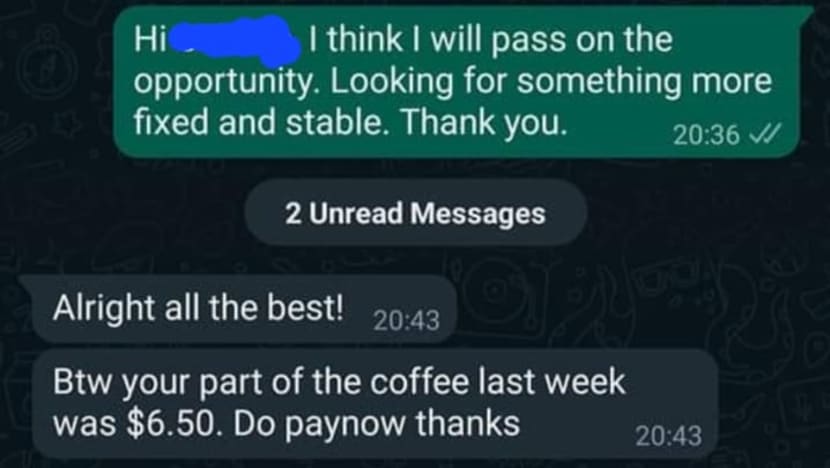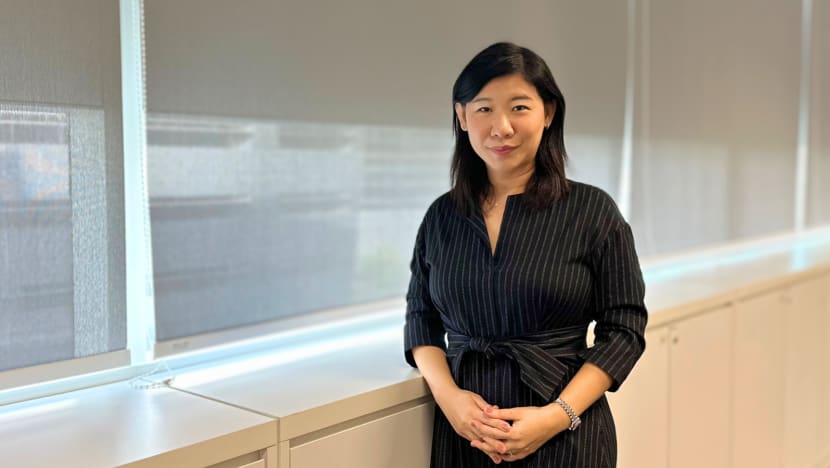Commentary: A S$6.50 coffee bill serves as a reminder of professionalism during job interviews
A jobseeker was recently asked to reimburse his interviewer for the coffee he consumed during their meeting. Such job interview shenanigans are not uncommon, says career strategist Adrian Choo.

SINGAPORE: Who should pay for coffee during a job interview?
This is not a trick question, nor a brainteaser interview quiz.
An aggrieved jobseeker recently took to social media to recount an experience he had, sparking an intense discussion about interview etiquette.
The man said he was asked several days after his interview to pay S$6.50 (US$4.80) for a cup of coffee he had during the meeting, after declining a job offer from the interviewer.
“Had I known, I would have paid on the day itself. Now it just seems unprofessional,” he said.
Amid an outpouring of rage on social media, the situation was resolved after a manager from the company reportedly reached out to apologise to the job applicant. The man also got his money back.
“Surely such interview shenanigans are few and far between,” one might think.
Actually, they aren’t. From my two decades of experience in human resources and recruitment, there are cautionary tales from both misbehaving interviewers and interviewees.
A RESHAPED JOB MARKET
There is no question that the COVID-19 pandemic has dramatically reshaped the job market, resulting in a significant shift towards remote work and Zoom meetings and online job interviews.
However, as the world regains a semblance of normalcy and more employees return to the office, in-person job interviews are also increasingly returning to fashion.
A recent survey of more than 2,000 adults by the American Staffing Association showed that 70 per cent of respondents preferred in-person job interviews, compared with 17 per cent who favoured video interviews and 9 per cent who preferred audio-only calls.
In today's competitive job market, the coffee incident brings a renewed focus on professional etiquette.
According to advance labour market estimates released by the Manpower Ministry (MOM) on Apr 28, total employment - excluding migrant domestic workers - grew by 34,500 in the first quarter of the year, marking the sixth straight quarter of expansion.
It goes without saying that both jobseekers and recruiters should always be professional during and after the interview. As with anything, there’s always a but ...
THE IDEAL PRESENTATION
During the course of my work, I’ve personally observed more than a few unprofessional behaviours that can serve as good learning lessons.
In one example, Sally (not her real name) was asked during an interview to prepare a case study on how she might help a struggling company turn its revenue around.
In her enthusiasm, she prepared a 27-slide PowerPoint deck on the strategies, tactics, and key target clients the company could acquire. Being from the same industry, she had some great ideas for turning the business around and proposed a new service called “Chrysalis” to pivot the company into a new and more profitable market.
She presented her deck to the business leader who was very impressed. “Let me get back to you,” he promised.
Two months passed and she didn’t hear from him. To her surprise, she was informed by a vendor that the company she interviewed with was going to launch a new service called "Crystallize", which was remarkably similar to what she had pitched.
She confronted the interviewer, but he nonchalantly replied: “Actually, we had this idea six months ago, so this wasn’t yours.”
Only then did Sally realise that her intellectual property had been ripped off.
Lesson learnt: Be wise about how much information you give away at the interview, especially when interviewing with a competitor.
How do you transition from school to your first job? Listen to this episode of Work It:

THE “CREATIVE” DIRECTOR
In another example, Johnny (not his real name) was interviewing for a regional creative director role at a European advertising agency. The CEO wanted Johnny to meet the board members in person at the headquarters in the UK, before offering him the position.
“Don’t worry, we’ll pay for your business class air ticket,” the CEO told him.
Johnny flew there, met the leadership team but came home empty-handed, tail tucked between his legs.
It turned out he had used the business class ticket the company provided, downgraded it to a pair of economy tickets to bring his wife along for a free holiday and pocketed the difference as travel money.
“He didn’t even check whether we were okay with that. We felt it was not a professional thing to do and reflected his poor decision-making skills and questionable ethics, so we rescinded the offer,” the CEO later told me.
Lesson learnt: Integrity is the number one trait companies are looking for in employees.
IT TAKES TWO HANDS
And sometimes it is not just one party who misbehaves but both who are equally guilty of bad behaviour.
Cliff (not his real name) secured an interview with the managing director of a company via a recruiter. The interview went well, stretching on for two-and-a-half hours, including a dinner at a nearby Michelin-starred restaurant.
A job offer was put on the table, and the managing director proposed bypassing the recruiter and splitting the agent commission with Cliff.
Cliff didn’t know whether it was a test, but ultimately agreed to the plan.
Six months later, I met Cliff and asked him how things were. He told me he was out of a job because “the managing director who hired me had ‘serious integrity issues’ and withheld my salary and the promised half of the fee”.
Lesson learnt: Watch for red flags during the interview process and at the first sign of trouble, politely decline and walk away.
As those three examples show, many scenarios can play out during interviews from both sides of the table. The most important thing to note is that with the easy availability of social media, things can get blown out of proportion and reputations can get irreversibly damaged.
This is a reminder to be on one’s best behaviour during the interview process.
Adrian Choo is the CEO and founder of Career Agility International, a career strategy consultancy.




















